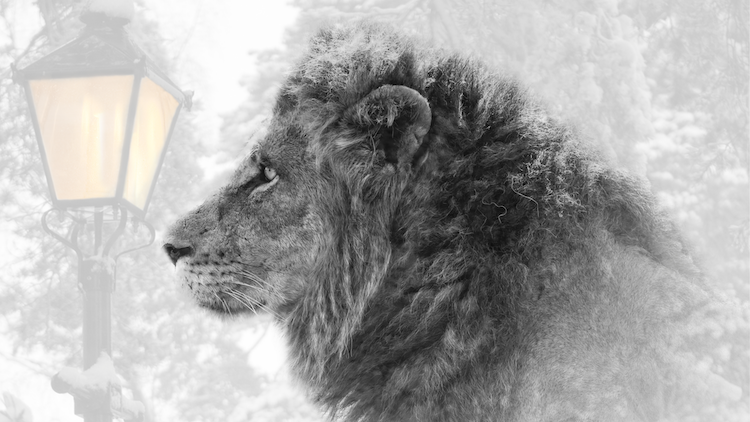Throughout Lent, guest blogger Dr. Junius Johnson will be reflecting on the season through the lens of C.S. Lewis’s great series, The Chronicles of Narnia. We invite you to join him in revisiting this world of childhood imagination even while you prepare your hearts to rejoice again in the salvation Christ worked at the cross.
I can’t tell you the number of times I’ve heard people remark on a snowy landscape that it is like Narnia. I get it: when we first cross into Narnia, it is snowy, and the snow gets attached to that first enchantment of finding yourself in a new world and meeting a faun there. But we should be careful: wintry Narnia is cursed Narnia. I’m not saying it only snowed in Narnia during the 100 years’ curse; obviously Narnia has seasons, and we see snow at the end of The Silver Chair. But I don’t think that’s the scene everyone is thinking of when they compare a snowy day to Narnia. Narnia should be envisioned in spring or summer, lest we normalize the curse, and forget that the snow-locked land is, in fact, cursed.
This cursed land is an image of the world if Christ had not come to be one of us, if Christ had not died for us. The world would lie still locked in the long winter of sin, a winter by definition without the possibility of Christmas, for there is no Christmas without Christ. Even in a world in which Christ did come, and was always going to come, it is an image of the time of the famine of hearing the word of God.
. . .for there is no Christmas without Christ.
Faun Tumnus shows what it looks like to try to scratch out an existence in such a hopeless world: how it eats away at who you are until you consent to be that which is furthest from your own nature, and take up service under the powers of evil. What had to be true for him to do this? Do you think that an educated faun like Tumnus, who enjoys reflecting on the philosophical question of the existence of man (as is evident from the books on his shelves), could be ignorant of the prophecies? Then how could he agree to do for the witch that which would insure the prophecies never came true? It is because he gave up hope. He doesn’t believe in the prophecies any more, he may not even believe in humans, and Aslan is well on the way to becoming the sort of legend that we will see him to be for someone like Trumpkin in Prince Caspian. Tumnus is a warning of what can happen if you lose heart: you not only find yourself outside of grace; you might even find yourself the enemy of grace.
The Beavers, on the other hand, are examples of the danger that the faithful live under in such darkness, and the power of staying true even when there is little reason to hope for rescue. They never doubt the prophecies (not that we see), they never doubt the existence of humans, and they never stop looking for Aslan’s return. They are like Anna and Simeon, coming to the temple every day, hoping to catch a glimpse of the new-dawned salvation.
So, two different ways of being in a cursed land: the one marked by hope, the other marked by despair. And how these disparate approaches will be judged will hang on what actually happens. If Aslan returns, the Beavers will be vindicated as faithful to the end, while Tumnus will be condemned as a traitor; but if he does not return, if the witch’s reign stretches to the end of the world, then Tumnus is shown to have been prudent and realistic, while the Beavers are shown to be fools who wasted their lives chasing after rainbows.
But Aslan does return: The Beavers’ hope is fulfilled. Like Simeon and Anna, their role in the story is done once they deliver the children to Aslan: we don’t hear anything more of them after the first book. Yet they are rewarded for their faithfulness with a reward like that given to the woman who broke perfume over Jesus: they become an immortal part of Narnia. Long after anyone remembers why it is called that, the place where Mr. Beaver built a trifling dam was known as Beaversdam, and it eventually becomes the capital of Telmarine Narnia.
Yet they are rewarded for their faithfulness…
And it is not Tumnus’ fate to be remembered as a traitor. There is forgiveness and restoration for him, because he turned from his despair before it was too late, before Aslan had returned or was known to be returning. He got back to living like a Narnian, and so he is even able to be part of the Aslan conspiracy, getting word to the Beavers to take charge of the children and see that they make it to Him. And so Tumnus becomes, rather than a byword about the ingratitude of despair, an image of the power of hope, even when one comes to it late, to break the power of the curse: not in the world, but in the heart of the one who hopes.
Indeed, when Aslan does return, and the curse is broken, he shows that even then, when it ought to be too late, it is not. For he shows, in fulfillment of a prophecy he made 1000 years earlier (when he said he would insure that the worst of the witch’s evil would fall on himself), just how mind-bogglingly far he is willing to go to save even one traitor.
And in our world too, Aslan has come. More importantly, he will come again, and is already on the move. And so wherever you fall, whether you are more like the Beavers or like beastly Edmund, you have reason to rejoice in Aslan’s coming. Only those who are sold out to the witch, whose devotion to her is so absolute that the only feeling for Aslan they have space for is hatred: these alone are doomed. Choose this day whom you will serve.

Junius Johnson is an independent scholar, teacher, musician, and writer. He is the executive director of Junius Johnson Academics, through which he offers innovative classes for both children and adults that aim to marry the sense of wonder with intellectual rigor. An avid devotee of story, he is especially drawn to fantasy, science fiction, and young adult novels. He performs professionally on the french horn and electric bass. He holds a BA from Oral Roberts University (English Lit), an MAR from Yale Divinity School (Historical Theology), and an MA, two MPhils, and a PhD (Philosophical Theology) from Yale University. He is the author of 4 books, including The Father of Lights: A Theology of Beauty. An engaging speaker and teacher, he is a frequent guest contributor to blogs and podcasts on faith and culture, and is a member of The Cultivating Project. Explore his work at juniusjohnson.com.

